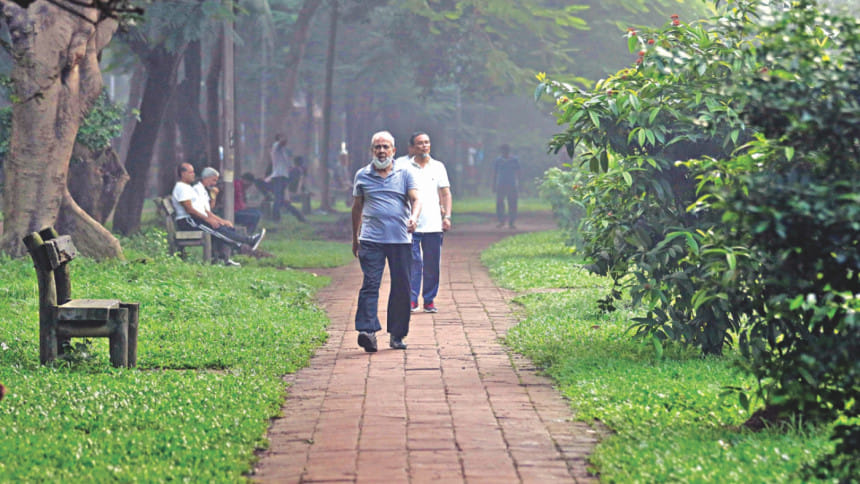Taking care of our senior citizens

It is estimated that by 2050, about one in every four persons living in Bangladesh will be over the age of 60. That is a major chunk of the population: a population which will need accessible health facilities for the ailments that accompany age. There will be need for care facilities, and easy to use public transport, support from the community, and an understanding that we must do every thing we can to give them a life which is not one of neglect and apathy. Now, for those who can afford it, there are private homes, expensive hospitals, cars; they have unfettered access to the services required to live a comfortable retirement. But what about those, and they are the majority, who cannot afford to do so? Surely, our constitutional promise to provide social security to the elderly needs to be as inclusive as possible. And yet, the challenges of old age, and their care is an issue that is either talked of in purely sentimental tones, or not at all.
Growing old is inevitable. With all the progress in development and rapid urbanisation, our old familial support structures are all but gone. What is going to replace these structures? The government policies and programmes in effect are too little to be sustainable, while private facilities are mostly beyond the reach of those most-deprived. These leave the elderly in a position of neglect, where they cannot get access to the healthcare they need, or the support they deserve.
The United Nation's International Day of Older Persons is a reminder for us that the issues affecting the elderly, from the medical to the social, are concerns for us all. This year, the theme for the observation is: Take A Stand Against Ageism. Currently, about 7.7 percentage of the population of Bangladesh are elderly according to the Bangladesh Bureau of Statistics. Most of these people have no income to be self-dependent. And, even when each of us can contribute to make the country a better living place for the elderly, it is the state policies and interventions we must looks towards due to the economic realities of the country.
The GlobalWatch Index 2015 ranks Bangladesh at 67 in terms of the social and economic well-being of the elderly. Even taking into account that Bangladesh is a developing country and cannot well be compared to the welfare states of Europe, that is a worrying number. Although the think tank cites that the elderly in Bangladesh are relatively content in terms of safety, public transport and civic freedom, compared to its regional neighbours, Bangladesh performs low in the health, life expectancy and income security. This is where the country's social safety-net and welfare policies should be making an impact.
The few schemes in terms of pension that are currently available for the retired are only for government employees, and constitutes only a "negligible fraction of the total population." (Unnayan Onneshan Policy Brief On Present Social Context and Elderly Population in Bangladesh) The Seventh Five Year Plan of Bangladesh envisioned a comprehensive pension system for the elderly which would include the existing Old Age Allowance (OAA) for senior citizens, a national social insurance scheme. Its stated mission is to build a social security programme that "effectively tackles and prevents poverty and inequality and contributes to broader human development, employment and economic growth." But, gaps and inadequacies remain in the system. The OAA covers only about 30 percent of the target population, and this too offers a monthly transfer amount of a few hundred Taka per beneficiary per month. "This figure compares poorly with the pension scheme of Nepal – (expenditure of 0.35 percent of its GDP, covering over 70 percent of older population)," writes Bazlul Khondker, an economics professor of the University of Dhaka. (Taking care of our senior citizens, The Daily Star, 2015) He also suggests that due to poor targeting over "50 percent of benefits go to non-poor older people and almost a third of the benefits go to those below the age of eligibility".
These structural problems are mentioned in the National Social Security Strategy of Bangladesh too, as it calls for structural and administrative reforms. That is, those who need it the most are not the ones being helped, and corruption and mismanagement remain the norm.
In terms of healthcare, Bangladesh lags behind its neighbours. This is compounded by our complete lack of empathy for the stress and inconvenience of our elderly. Effective infrastructure, such as public healthcare facilities where the elderly can get access to treatment are needed. The Population Reference Bureau (PRB) recommends a prevention approach to the healthcare for the elderly, which calls for encouraging healthy lifestyle choices "that would mitigate chronic diseases or delay their onset."
While Bangladesh has surely taken the right first step in ensuring social welfare of the elderly through its social security policy and the OAA, it is not enough. What is needed is a comprehensive plan which would ensure inclusiveness. And since the issue has not been given enough importance, little attention has been given to the plight of the elderly. But, in preparation of the changing demographics, we must bring effective reform. There have been suggestions of universal pension schemes for all tax-paying citizens after retirement, allocation of elderly cards for access to transportation and low- or no-cost healthcare, increasing budgetary allocation for the OAA, and community based services with the involvement of the private, public and non-government sectors. Our public health approach to child nutrition and mortality have been a massive success in the past, so maybe it a similar programme involving WHO's recommended prevention approach may be in order.
And of course, it goes without saying that in the spirit of this year's theme of the International Day of Older Persons, a social change must be encouraged so that in the tide of rapid development, our familial bonds are not overpowered, and our tradition of being there for our ageing family members does not go extinct.
The writer is a member of the editorial department, The Daily Star.

 For all latest news, follow The Daily Star's Google News channel.
For all latest news, follow The Daily Star's Google News channel. 



Comments